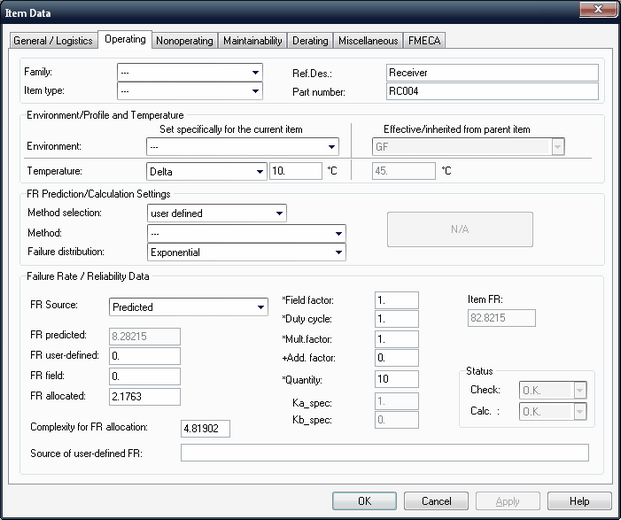|
Item data editing |

|

|
|
|
Item data editing |

|

|
Item data editing
To edit item data:
| 1. | Open the product tree view. |
| 2. | Navigate to the desired item and select it. |
| 3. | Double-click the item if it is component or right-click it and choose "Edit" from the popup menu. |
| 4. | Item data screen will appear: |

Item data dialog contains multiple pages. The page which is related to the currently selected analysis type (Operating, FMECA etc.) is active by default. Switch between pages to enter the available information.
The General page contains general item information like Part Number, Catalog Number, Description and more:
Field |
Description |
|---|---|
Family |
Component family - Electronic or Mechanical. Leave "---" for assembly. |
Item type |
Component Item type, like resistor, capacitor or spring. Each family has its own list of Item types. See the full list of all possible Item types later in this manual: Item type abbreviations |
Ref.Des. |
Reference Designator |
Part Number |
Part Number |
Quantity |
Quantity of components in the current assembly |
Catalog number |
Item catalog number typically in-house part identifier |
Military number |
Item military number |
Generic name |
Item generic name used in library searches for component data |
Description |
Item description |
Remark |
Item remarks |
Item Function |
Description of item function |
Manufacturer |
Component manufacturer. Allows manual input or selection from drop-down list of manufacturers. |
Background color |
Item background color in the tree view. Press "Change" button to set the color using color picker. Colors are convenient way to mark items in the product tree - problematic with red, approved with green etc. - according to your needs. |
LCN |
Logistics Control Number |
ATA Number |
The ATA Chapter numbers provide a common referencing standard for all commercial aircraft documentation. This commonality permits greater ease of learning and understanding for pilots and engineers alike. The standard numbering system is controlled and published by the Air Transport Association. The unique aspect of the chapter numbers is its relevance for all aircraft. Thus a chapter reference number for a Boeing 747 will be the same for a Airbus 380. Examples of this include Oxygen (Chapter 35), Electrical Power (Chapter 24) and Doors (Chapter 52). |
Repair turnaround time |
Time (days) required to send the failed part for repair and get it back repaired. Used in Spare parts calculation/optimization. |
SMR Code |
Usually 5-character "Source Maintenance Recoverability" code, used for ILS (Integrated Logistics Support) |
Condemnation rate |
Percent of items needing repair that will not be repaired |
Spare parts min |
Minimal number of spare parts to be on stock at all times. Used in Spare parts calculation/optimization. |
Spare parts max |
Maximal number of spare parts allowed. Used in Spare parts calculation/optimization. |
Miscellaneous page contains additional optional parameters:
Field |
Description |
|---|---|
Item price |
Item’s price in selected currency |
Currency |
Currency code (USD, EUR etc.) |
Item weight |
Item weight in kilograms |
Item volume |
Item volume |
Power consumption |
Power consumption in watts |
Current consumption |
Current consumption in Amperes |
Burn-in Temperature |
Burn-in temperature in degrees centigrade (see Burn-In Report for more information) |
Burn-in Time |
Burn-in time in hours (see Burn-In Report for more information) |
PI FY |
Result from burn-in calculation. First year multiplier (ratio of the first year failure rate to the steady state failure rate). |
ILS Data |
Integrated Logistics Support user-defined fields. You may change both field name and field value to specify additional information which does not fit the predefined Item Data dialog fields |
For reliability prediction and analysis you should also define the environment and temperature of product tree assemblies and components - see next paragraph Environment and Temperature Definition for more information.
See more information about other Item data dialog pages related to the specific analysis type (Operating/Non-operating reliability, Maintainability, FMECA etc.) in relevant chapters later in this manual.
| 5. | Press Ok - product tree view and the database will be updated. |